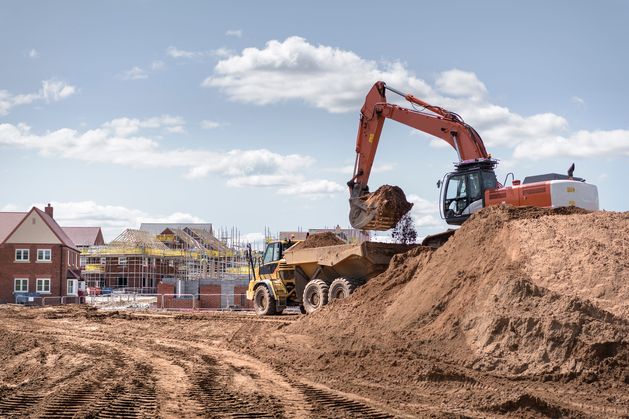Bussiness
New €10 waste levy on soil and stone will add thousands to cost of new homes, claim builders

Measure is aimed at driving recycling rates in sector but operators claim facilities are not there yet
The Department of the Environment, Climate and Communications is now at loggerheads with operators in the sector after it gave them a 14-week warning that from September 1 it will remove the waste levy exemption on soil and stone taken from sites and reused to backfill quarries and on other projects.
Operators will now need to segregate waste using specialised recycling facilities to avoid the charge. But a number of operators claimed that, unlike the UK, such facilities are not yet available and face long delays in the planning system.
‘This just puts more power into the hands of the large players who already control aggregate materials,’ said one operator. Photo: Getty
The new levy could almost double the cost per truck leaving construction sites from September 1, said industry sources. The removal of a typical 20-tonne load of soil and stone costs between €150 and €200 and the levy could add €200.
One plant and haulage operator in the sector cited the example of a 98-unit residential development currently under way in south Dublin, which required the removal of 55,000 tonnes of soil.
“If the planned €10 per tonne tax is added in September, it will increase the cost of the project by €550,000,” said the operator. “This will therefore add a base cost of €5,612 to the price of a [housing] unit.
“This will mean it will now cost in total on average up to €12,000 to remove soil off a typical residential development of this size.”
The extra cost would be higher again for high-rise sites in city centres.
One industry observer said they believed the levy was necessary to drive change in the sector. Photo: Stock image/Getty
The Department had signalled last December that a review of the exemption of roughly nine million tonnes of construction and demolition waste, 85pc of which consists of soil and stone, was under way.
The Department of the Environment had not responded to a request for comment at the time of going to press, but one industry observer said that they believed the levy was necessary to drive change in the sector.
“Surely they knew this was coming down the track? It can’t have come as a huge surprise. The industry has not always been the fastest to modernise. The industry needs to start being proactive and getting to grips with modern methods of construction and the circular economy,” said the observer.
But plant operators and hauliers say the 14-week time frame announced by the Department gives them inadequate time to invest and develop recycling facilities they need to avoid the levy.
“This could cause the entire industry to grind to a halt overnight,” claimed one operator. “Who will pay the extra cost? The developer on site? Me as the haulier who takes it away? Or the site where it is brought? Nobody knows.
“This just puts more power into the hands of the large players who already control aggregate materials.”
This levy will significantly increase the cost of new homes, which will particularly affect young people, wrote Irish Plant Contractors Association CEO Brian Coogan in a letter to the Taoiseach
Another operator said he would need to invest €500,000 on recycling and separation equipment to avoid the levy but he could not justify this because of the lack of clarity about what was being proposed.
“This material – soil and stone – is absolutely not waste material. But the problems and delays in the planning system mean we cannot possibly put in place the facilities we need to recycle it.”
The Irish Plant Contractors Association had three years ago proposed in a report to government a construction recycling system similar to what operates in the UK. But there had been no consultation ahead of the Department’s announcement, claimed its CEO Brian Coogan.
In a letter to Taoiseach Simon Harris last week he claimed the move was counterproductive and could see the industry “grinding to a halt on September 1”.
“This levy will significantly increase the cost of new homes, adversely affecting those, particularly young people, who wish to purchase starter homes,” wrote Coogan.
“One of our primary concerns, Taoiseach, is the lack of consultation with the broader industry,” he wrote.
“We believe that implementing such reforms on a narrow timeline will lead to confusion and stagnation within the construction sector.”












